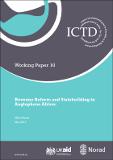Revenue Reform and Statebuilding in Anglophone Africa
Abstract
Within the development field, tax administration reform is an area of relative success. Over the
past two decades, the national revenue systems of most countries in anglophone Africa have
undergone major reforms. These comprise, in particular, the introduction of Value Added Tax
(VAT), the adoption of ‘advanced’ tax administration practices, and the creation of semiautonomous
revenue authorities. What do these reforms imply for emerging patterns of politics
and governance in anglophone Africa?
The first conclusion is conceptual and theoretical. The impact of these reforms has been shaped
by the broad context within which they were being implemented, especially the increasingly
transnational character of many important policymaking relationships (Orenstein and Schmitz
2006; Stone 2008; Weiss 2005). Senior African revenue staff feature increasingly in
transnational expert networks, and face a wider range of employment opportunities, public and
private, both at home and abroad. The second conclusion is that these revenue reforms have
contributed only modestly to statebuilding. While the new revenue agencies are in many
respects impressive organisations, actual revenue collection has not increased much;
improvements in organisational capacity have been concentrated at national and capital city
level; potentially synergistic improvements in the capacity to formulate tax policy have not
occurred; and some anticipated spillover benefits from improving the revenue collection
apparatus have not been realised. The third conclusion is that, while these reforms have made it
possible for governments to raise revenue from the organised private sector in a more
‘Weberian’ (institutionalised, rule-bound) and a more consensual manner, they have also
increased the possibility that the taxation system will be shaped by private sector interests,
making it difficult for governments to raise the revenue that they claim they need.

